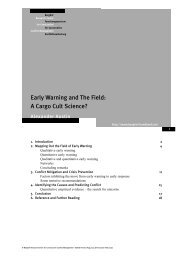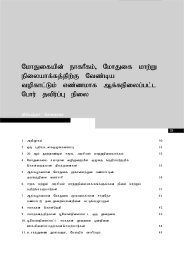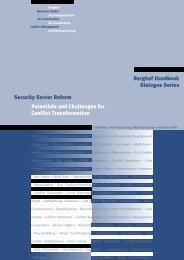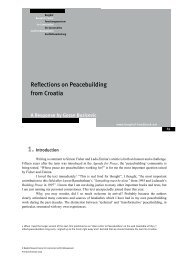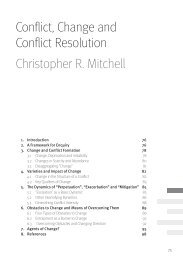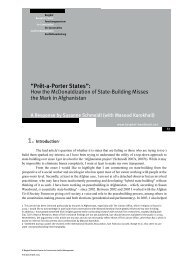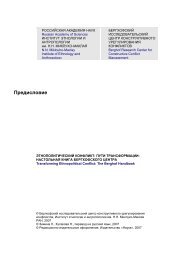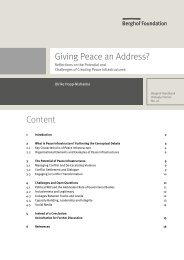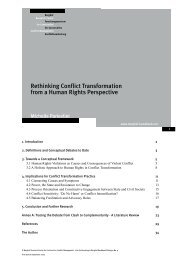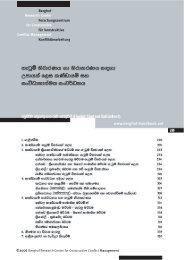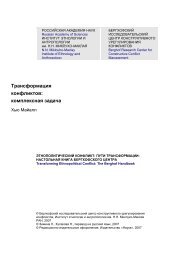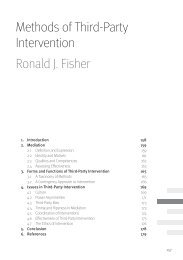Human rights and conflict transformation: The challenges of just peace
Human rights and conflict transformation: The challenges of just peace
Human rights and conflict transformation: The challenges of just peace
You also want an ePaper? Increase the reach of your titles
YUMPU automatically turns print PDFs into web optimized ePapers that Google loves.
50<br />
Bergh<strong>of</strong> H<strong>and</strong>book Dialogue No. 9<br />
human <strong>rights</strong> mechanisms like the African <strong>Human</strong> Rights Court <strong>and</strong> the Association <strong>of</strong> Southeast<br />
Asian Nations have all advanced the efforts for the protection <strong>of</strong> human <strong>rights</strong>, <strong>and</strong> myriads <strong>of</strong><br />
human <strong>rights</strong> NGOs continue to lobby states, international organisations <strong>and</strong> the international public<br />
for mobilisations against human <strong>rights</strong> violators (Schmitz/Sikkink 2002).<br />
It is ironic that the use <strong>of</strong> the discourse by so many diverse groups ignores the<br />
interrelatedness <strong>of</strong> politics <strong>and</strong> human <strong>rights</strong>. Indeed, the problem <strong>of</strong> reducing human <strong>rights</strong> to legal<br />
norms, as identified by Parlevliet (in this volume, 16) is not merely one <strong>of</strong> incomplete analysis.<br />
It is in itself a political act that lends credibility <strong>and</strong> authority to those that speak in the name <strong>of</strong><br />
human <strong>rights</strong>, <strong>and</strong> at the same time puts their claims beyond political contestation in the name <strong>of</strong> an<br />
indisputable universal truth. This move has significant consequences for the role <strong>of</strong> human <strong>rights</strong> in<br />
<strong>conflict</strong>s.<br />
On the one h<strong>and</strong>, the language <strong>of</strong> human <strong>rights</strong> has been appropriated by a plethora <strong>of</strong><br />
actors to support <strong>and</strong> legitimise their multifarious aims <strong>and</strong> objectives within a <strong>conflict</strong> environment<br />
– not all <strong>of</strong> them with <strong>conflict</strong> resolution in mind. <strong>Human</strong> <strong>rights</strong> articulations in <strong>conflict</strong> constitute<br />
a discourse that has been characterized by high malleability <strong>and</strong> international appeal, lending<br />
legitimacy <strong>and</strong> authority to its interlocutors for dispute <strong>and</strong> power contestation in the political<br />
arena, <strong>and</strong> therefore for the continued securitisation <strong>of</strong> <strong>conflict</strong>s. For example, wars in the former<br />
Yugoslavia were fought in the name <strong>of</strong> human <strong>rights</strong>. Croats used the discourse <strong>of</strong> human <strong>rights</strong> in<br />
their campaigns against Serbs in Croatia <strong>and</strong> against the Muslims in Bosnia. Likewise, conservative<br />
Serbian intellectuals <strong>and</strong> <strong>of</strong>ficials claimed that Serbs were the victims <strong>of</strong> ‘genocide’ <strong>and</strong> that their<br />
<strong>rights</strong> as Serbs were being violated in the rest <strong>of</strong> Yugoslavia.<br />
On the other h<strong>and</strong>, human <strong>rights</strong> are portrayed as non-political, non-negotiable moral<br />
absolutes. Yet what is expressed as universal morality in the international legal order does not take<br />
into account that the concept emerged <strong>and</strong> developed in a specific history <strong>and</strong> tradition, namely the<br />
Enlightenment <strong>and</strong> liberal political philosophy. Several scholars have pointed to the limitations <strong>of</strong><br />
such an apolitical human <strong>rights</strong> discourse. Evans (2001) questions the relationship between human<br />
<strong>rights</strong> <strong>and</strong> democracy <strong>and</strong> argues that the cause <strong>of</strong> human <strong>rights</strong> violations lies in the structures <strong>of</strong><br />
the global political economy. Globalisation <strong>and</strong> its agents (multinational corporations, international<br />
financial institutions) support a very thin underst<strong>and</strong>ing <strong>of</strong> human <strong>rights</strong> without responsibilities.<br />
Similarly for wa Matua (2000), human <strong>rights</strong> express the basic Western liberal values <strong>and</strong> are being<br />
exported throughout the world, <strong>and</strong> especially the non-Western world. Although it is important<br />
to underst<strong>and</strong> the contradictions that shape the human <strong>rights</strong> language <strong>of</strong> moral intervention, it is<br />
equally important to engage with its dynamic character for the accommodation <strong>of</strong> difference.<br />
<strong>The</strong> human <strong>rights</strong> discourse is available to an unlimited range <strong>of</strong> actors as a means to<br />
pursue their political objectives. It has been constructed <strong>and</strong> articulated within the dem<strong>and</strong>s <strong>of</strong> social<br />
movements for equality <strong>and</strong> <strong>just</strong>ice. It has been shaped by the struggles against authoritarianism,<br />
racial discrimination <strong>and</strong> colonisation as well as by mobilisation for the <strong>rights</strong> <strong>of</strong> workers, women,<br />
ethnic minorities <strong>and</strong> indigenous people. When it comes to being used by <strong>conflict</strong> resolution<br />
<strong>and</strong> human <strong>rights</strong> practitioners, its political character must be taken into account. Thus, <strong>conflict</strong><br />
resolution <strong>and</strong> human <strong>rights</strong> practitioners should be better <strong>of</strong>f to acknowledge the fact that the human<br />
<strong>rights</strong> discourse is far from being a universal <strong>and</strong> ahistorical doctrine, <strong>and</strong> to conceptualize it as an<br />
instrument for articulating the needs <strong>of</strong> the marginalised <strong>and</strong> the excluded, which is both political<br />
<strong>and</strong> legal in character.



